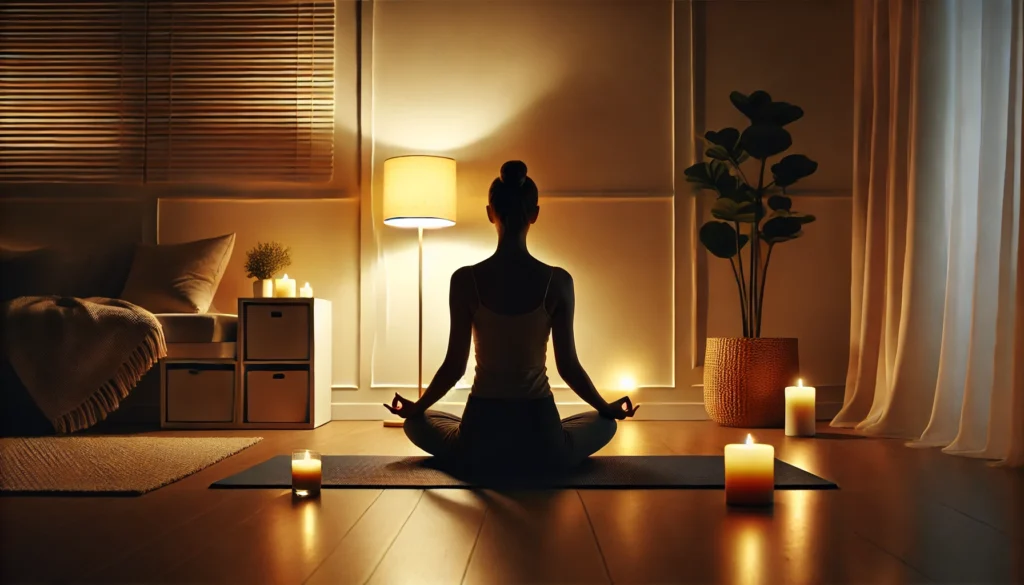Exercise and sleep are two pillars of health. They are interconnected in ways that can significantly impact your overall well-being.
But how does one influence the other?
This article delves into the science behind the relationship between exercise and sleep. It aims to answer common questions like “Does exercise make you tired?” and “Is it good to sleep after a workout?”
We’ll explore how different types of workouts can affect your sleep patterns. We’ll also discuss the role of exercise intensity and timing in relation to sleep quality.
Moreover, we’ll provide practical strategies for optimizing sleep after exercising. These strategies will help you integrate sleep and exercise effectively into your health and wellness routine.
Whether you’re a fitness enthusiast, a health and wellness coach, a science journalist, or a biohacker, this comprehensive guide is designed to provide you with reliable and actionable information.
Let’s dive in and uncover the secrets of optimal sleep strategies for fitness enthusiasts.
You May Also Like: Maximize Energy: Sleep Less, Achieve More
The Science of Sleep and Exercise
Understanding the interplay between sleep and exercise can enhance your fitness journey. Both are critical for recovery and overall health.
Exercise affects the body in ways that can improve or hinder sleep. Key elements include the type, intensity, and timing of the workout.
Aerobic exercises like running boost endorphins, which can lead to better sleep. Anaerobic activities, such as weightlifting, also have benefits.
Endorphins help reduce stress, promoting relaxation. They can make falling asleep easier and enhance sleep quality.
Exercise affects body temperature, crucial for sleep onset. It raises your body temperature temporarily.
Afterward, as your body cools, you’ll feel sleepier. Timing your exercise can thus help optimize sleep. Key factors influencing sleep include:
- Type of Exercise: Aerobic vs. anaerobic.
- Exercise Timing: Morning vs. evening workouts.
- Intensity: Light, moderate, or high intensity.
How Exercise Influences Sleep Quality
Exercise can dramatically improve sleep quality. It promotes deeper sleep stages, which are vital for recovery.
Your body uses deep sleep to repair tissues and build muscle. This is especially crucial for active individuals.
Engaging in regular exercise also helps regulate the sleep cycle. It can reduce sleep latency, making it easier to fall asleep.
The Role of Workout Intensity and Timing
Workout intensity and timing greatly affect your sleep. High-intensity workouts can leave you feeling energized but also aid better sleep later.
Timing your exercise is important. Morning workouts can set a positive tone for the day and help regulate circadian rhythms.
Evening workouts might interfere with sleep if done too late. Allowing at least a few hours before bedtime can mitigate this.
Understanding Your Sleep Cycle
The sleep cycle consists of various stages critical for recovery. Exercise can enhance these stages, improving overall sleep quality.
Each cycle includes light, deep, and REM sleep. Deep sleep is essential for physical recovery, while REM sleep aids in cognitive functions.
Regular exercise can help ensure more stable sleep cycles. It fosters a balanced cycle with sufficient deep and REM sleep stages.

Common Myths and Questions
The relationship between exercise and sleep is often misunderstood. Many myths can lead to confusion about this vital interplay.
Misconceptions about exercise making you too tired or too awake are common. Understanding these can help optimize your fitness routine.
Some believe late workouts disrupt sleep, while others think they aid in falling asleep. Scientific evidence provides clarity on these myths.
Addressing these questions helps set a clear path for integrating exercise into sleep routines. Let’s explore the facts behind these common myths.
Does Exercise Make You Sleepy or Energized?
Exercise has a dual impact on the body. Initially, it might boost energy levels due to increased adrenaline.
However, as the body cools down, a sense of fatigue can set in. This is especially true if the workout was strenuous.
The type of exercise also matters. High-intensity workouts can leave you energized initially but promote better sleep later.
Is It Good to Sleep Immediately After a Workout?
Sleeping right after a workout isn’t always ideal. The body needs time to transition from exercise to rest.
A proper cool-down period helps your body shift to recovery mode. This transition is essential for optimal relaxation and sleep.
It’s best to wait at least an hour post-workout before sleeping. This allows your body to fully benefit from both exercise and restorative sleep.
Can Exercise Help with Sleep Disorders?
Exercise can be a natural remedy for some sleep disorders. It helps regulate the sleep-wake cycle, promoting more consistent sleep patterns.
For those with insomnia, regular physical activity has shown significant benefits. It can ease symptoms by reducing stress and improving mood.
However, it’s crucial to balance exercise intensity and rest. Overexertion may exacerbate sleep issues instead of alleviating them.
Optimizing Sleep After Workouts
Optimizing sleep post-workout involves strategic planning and lifestyle adjustments. Understanding the body’s needs is crucial for enhancing sleep quality.
Timing your workout can greatly impact your sleep. Morning exercise might elevate energy, while evening sessions could require careful scheduling.
Creating a routine that includes a gradual wind-down process can be beneficial. This might encompass stretching, meditation, or a warm bath.
Adopting a consistent sleep schedule further enhances recovery. Regularity in sleeping and waking times aids in regulating your body’s internal clock.
Best Practices for Post-Workout Recovery
Incorporating a cool-down phase post-exercise aids in transitioning the body to rest mode. Slow stretching and deep breathing help calm the nervous system.
Hydration and light snacks can also support recovery. Consuming these in moderation replenishes energy without overloading the system.
Mindfulness techniques such as yoga or gentle stretching improve relaxation. These activities can prepare both mind and body for sleep.
Creating an Ideal Sleep Environment
Crafting a sleep-conducive setting is fundamental for post-workout recovery. Maintaining a cool, dark, and quiet room encourages deep rest.
Investing in comfortable bedding is worthwhile. Quality pillows and mattresses can significantly affect the quality of your sleep.
Reducing screen time before bed minimizes blue light exposure, aiding in melatonin production. This hormone is essential for falling and staying asleep.
Nutrition and Hydration for Better Sleep
Proper nutrition plays a pivotal role in ensuring quality sleep post-exercise. Consuming complex carbohydrates and lean proteins can aid recovery.
Avoid heavy meals and excessive caffeine or sugar late in the day. These can disrupt sleep by elevating energy levels and triggering restlessness.
Staying hydrated is equally important. Proper fluid intake supports efficient bodily functions and can prevent cramps and discomfort that interrupt sleep.

The Impact of Overtraining on Sleep
Overtraining is when physical activity exceeds the body’s capacity to recover. This imbalance can lead to various disruptions, notably affecting sleep quality.
Sleep disturbances are common symptoms of overtraining. These can include insomnia, difficulty falling asleep, or frequent nighttime awakenings.
Chronic overtraining strains the body’s stress-response systems, raising cortisol levels, which can hinder deep sleep and prolong recovery.
Persistent fatigue and decreased performance are also indicators. Reduced sleep quality exacerbates fatigue, creating a counterproductive cycle for athletes.
Recognizing the Signs of Overtraining
Identifying overtraining requires vigilance and awareness of subtle changes. Unusual sleep patterns, such as trouble sleeping or waking up often, are key signs.
Feeling exhausted despite adequate rest is another indicator. It can manifest in both physical and mental fatigue throughout the day.
Mood changes, like increased irritability or anxiety, may also signal overtraining. These emotional shifts can further disrupt restful sleep.
Balancing Exercise Intensity with Adequate Rest
Striking a balance between workout intensity and rest is vital for optimal sleep. Scheduling rest days is essential to allow the body to regenerate.
Incorporating diverse workouts can prevent monotony and reduce stress. Mixing high-intensity with low-impact exercises supports recovery while maintaining fitness.
Listening to your body is crucial. Adjusting workouts according to energy levels can prevent overtraining and promote better sleep consistency.
Sleep Aids and Relaxation Techniques
Incorporating sleep aids and relaxation techniques can significantly enhance recovery for fitness enthusiasts. These tools help transition the body into restfulness, which is vital post-exercise.
Utilizing these techniques can improve sleep quality by reducing time taken to fall asleep and increasing deep sleep stages. Both are crucial for muscle recovery.
Prioritizing relaxation can also mitigate stress-induced sleep disturbances. Lower stress levels lead to more consistent sleep patterns.
It is important to experiment with different methods to find what works best for individual needs. Personal preferences can influence effectiveness.
The Role of Napping for Athletes
Napping is a powerful tool for athletes seeking additional recovery. Short naps can boost energy and improve mood, alleviating afternoon fatigue.
A nap lasting 20-30 minutes can enhance alertness and cognitive performance. It provides a mental and physical reset without affecting nighttime sleep.
For athletes, strategic naps can also aid muscle recovery by reducing cortisol levels. Lower stress hormones promote healing and readiness for future workouts.
Relaxation and Mindfulness Practices
Mindfulness and relaxation practices can reduce sleep latency and enhance sleep quality. Techniques such as meditation and deep breathing calm the mind before bed.
Practicing yoga or tai chi offers dual benefits. These exercises not only improve physical flexibility but also promote mental tranquility conducive to sleep.
Incorporating a brief wind-down period with relaxation techniques can signal the body it’s time to relax. This ritual fosters a smoother transition into sleep.
Natural Sleep Supplements and Their Effects
Natural sleep supplements like melatonin or valerian root can support sleep initiation and depth. These aids may be helpful when regular sleep cycles are disrupted.
It’s important to consult a healthcare provider before starting any new supplement. They can advise on the right choice and dosage based on individual needs.
Supplements should ideally complement, not replace, good sleep hygiene practices. A balanced approach combining both can yield the best results for restful sleep.

The Role of Technology in Sleep and Exercise
Technology plays an increasing role in optimizing fitness and sleep. Devices like smartwatches and fitness bands track activity and sleep patterns. This data offers insights into how workouts affect rest.
By analyzing these patterns, individuals can make informed decisions about workout intensity and timing. These adjustments can enhance overall sleep quality. Monitoring stress and recovery periods is also easier with technology, aiding in better training routines.
However, tech should be used judiciously. It’s crucial to combine data with personal cues and experiences. Users should remember devices are tools, not standalone solutions.
Sleep Tracking and Performance Monitoring
Sleep tracking devices provide valuable information on sleep stages and disruptions. They can reveal how different exercises impact sleep phases like REM and deep sleep.
Performance monitoring features help optimize workout regimes based on previous sleep quality. Users can adjust their fitness routines to maximize recovery and performance based on sleep insights. This approach benefits those looking to balance rigorous training with adequate rest.
Such tools can also identify potential sleep issues early. Addressing these problems promptly ensures consistent sleep quality, ultimately enhancing fitness outcomes.
Managing Blue Light Exposure for Better Sleep
Blue light emitted from screens can hinder melatonin production, making sleep elusive. Reducing exposure before bedtime is key to improving sleep quality.
Simple measures like using blue light filters on devices or enabling night mode settings can minimize impact. Additionally, establishing a digital curfew an hour before bed helps signal the body to wind down.
Creating a pre-sleep routine that limits screen time encourages better rest. Focusing on calming activities like reading or listening to music promotes a smoother transition into slumber.
Conclusion: Integrating Sleep into Your Fitness Regimen
Integrating sleep into your fitness plan is vital for achieving optimal health. Adequate rest supports muscle recovery and enhances performance. Without proper sleep, all your hard work in the gym may not yield expected results.
Prioritizing both exercise and sleep leads to a well-balanced lifestyle. Consider your body’s signals and adapt your routine as necessary. This holistic approach ensures long-term fitness and well-being.
Quality sleep impacts not just the physical but also the mental aspects of health. Restful nights improve cognitive function and mood stability. This mental clarity can boost motivation and adherence to fitness goals.
Incorporating mindful relaxation techniques and structured rest can enhance sleep quality. By recognizing the connection between sleep and exercise, you can achieve a healthier, more resilient body. This balance ultimately maximizes the benefits of both activities.
Further Reading:
Does exercising at night affect sleep?
Should I Nap Right After My Workout?
Should You Sleep After Workout? Our Pros And Cons on This Action
Important Note: The information contained in this article is for general informational purposes only, and should not be construed as health or medical advice, nor is it intended to diagnose, prevent, treat, or cure any disease or health condition. Before embarking on any diet, fitness regimen, or program of nutritional supplementation, it is advisable to consult your healthcare professional in order to determine its safety and probable efficacy in terms of your individual state of health.
Regarding Nutritional Supplements Or Other Non-Prescription Health Products: If any nutritional supplements or other non-prescription health products are mentioned in the foregoing article, any claims or statements made about them have not been evaluated by the U.S. Food and Drug Administration, and such nutritional supplements or other health products are not intended to diagnose, treat, cure, or prevent any disease.


